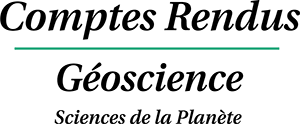In 2013, with a team of nine outstanding associate editors, I launched a new experimental editorial policy that is summarized in Courtillot (2014). After four years, it is time to evaluate the results of that policy.
To enhance quality and to shorten reviewing and decision time, we introduced a pre-submission step: authors would only send C. R. Geoscience a title, an abstract, and the names of four suggested reviewers, but not the full paper. The topic relevance, quality of the abstract and scientific level of suggested reviewers were elements of the decision to consider further the paper. The names of two selected reviewers would then be sent to the author, who would send them the full paper for review. The reviewers would send their review to the author, who would decide to revise or not. The author would then send the original paper, the revised paper, the two reviews, and an explanatory letter to C. R. Geoscience. The relevant editor would then quickly make the decision to publish or reject (or suggest resubmission, which was preferred to major revision).
Most of the pre-submission step was done on a voluntary basis by the editorial team. We dealt with far more papers than it appears in the C. R. Geoscience statistics: almost half of the pre-submitted papers were rejected and do not appear in the publisher's statistics. We thank the authors and reviewers for dealing with this important, but little visible step, with great care. As a result, the annual number of published pages and the annual number of issues of the journal diminished significantly, but the quality of the papers increased in inverse proportion. We had invited many high-level scientists to send us either review or frontiers papers. Many originally responded with enthusiasm, but finally failed to submit. Also, delays have arisen from authors who do not respect the page limit. Since that limit is clear, papers that exceed it should be rejected, but the editorial team did all it could to salvage these papers, leading to delays in publication.
Over the past four years, the new policy has met with many successes. The general scientific quality of papers has increased. Also, the quality of the English has improved significantly. The scientific range of contributing authors has broadened, for example with papers on social science aspects of geoscientific problems or with environmental questions. Invited papers from annual laureates of the French Academy of Sciences have met with good response. The geographical origin of authors and the location of research projects have broadened also, and are more balanced at the global scale. The main success in the past four years has been with such issues of the journal that made the scientific news and reinforced the visibility of CRG, at least in France! We intend to continue and expand in this direction. Papers that are reviews or belong to thematic issues are much more cited than others.
On the other hand, the pre-submission process was apparently difficult to understand for many authors and did not, in our view, meet with enough successes; we hope some of these aspects, that are already used by other prominent journals, will be considered again in the future. But for the time being, we prefer to revert to the more classical techniques used by most others. Starting 1 July 2018, full papers with author names, title, abstract, text, tables and figures and the names of four suggested reviewers will have to be submitted by the author. All indications will be in the journal site (https://ees.elsevier.com/geoscience). The pre-submission process is no longer needed. Full articles whose pre-submitted version has been previously accepted must be submitted as original articles. The goals of the journal remain the same (from Courtillot, 2013, 2014): Comptes rendus Geoscience ranks as a prominent international journal for the geosciences. It is referenced in all international publication databases and offers a means to publish quickly high-level scientific works in all the domains of Earth sciences, be it those related to solid Earth or to its fluid envelopes (that is, from the inner core to the atmosphere and the oceans). It benefits from the global visibility of its electronic version on ScienceDirect. A main objective is that Comptes rendus Geoscience should publish original papers and not “average” ones. The editorial team and the ‘Académie des sciences’ wish to encourage innovative work, thought-provoking papers that may generate debate, also papers arising from early-career scientists. Another key objective remains to invite review or frontier papers from outstanding scientists as well as to promote thematic issues on a theme (for instance papers from conferences) of special interest.


